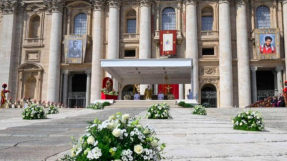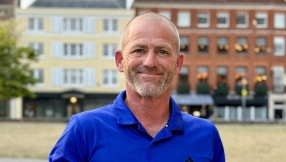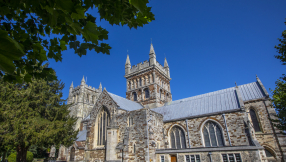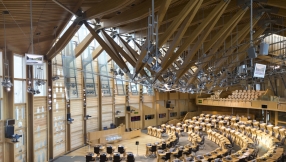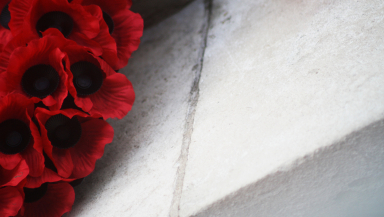
Eighty years ago, VJ Day was celebrated by Christians across the land but not many people know that it wasn’t until 2 September 1945 that Japan signed the official instrument of surrender. This is the story …
VJ Day 1945
Germany surrendered on May 8, 1945, which led to the end of war in Europe. This was called VE Day. However, even after Germany's defeat, her ally Japan kept fighting in the Far East and the war had not ended.
Arrangements
In anticipation of the upcoming end of the war, at the beginning of August, the British Home Office had sent a circular to local authorities advising them that arrangements should in general follow the practice of VE Day.
Whenever the day of declaring victory was to be, the following two days were to be declared bank holidays as Peace Celebration days. Places of work were not to open, except shops which were permitted to open to sell supplies, but close early. Bunting could be sold without coupons so long as it did not cost more than three pence per square yard. One stipulation was that church bells were allowed to ring.
Announcement
American President Harry S Truman announced the news of the Japanese surrender at a press conference at the White House on 14 August 1945. At midnight that day and into the opening minutes of 15 August 1945, British Prime Minister Clement Attlee spoke to the public in an unscheduled radio broadcast and said, "Japan has today surrendered … The last of our enemy is laid low. Peace has once again come to the world." In London crowds who were still up and awake gathered in Piccadilly Circus. Meanwhile outside London most people were asleep. 15 August 1945 was called Victory over Japan Day, to mark the end of hostilities. Today people talk of VJ Day but in fact there were two days of celebration which continued into September. Wednesday 15 August was known as VJ1, and Thursday 16 August was known as VJ2. Sometimes people talked of these being marked by the 3 Bs “bands, bonfires and bells”.
VJ1
Across much of Britain the morning of Wednesday 15 August was drizzly, and most people woke up not knowing the news. Some read the news in the newspaper. Many people turned up at work only to be turned away. Some went to the local railway station to get the train to work and read an announcement at the station which helped them avoid a useless journey. As news quickly got round, people queued up to buy supplies for parties, and food, bunting and fireworks all sold out. Long queues wound round the streets as people tried to beat the early closing at noon.
Street Parties
Houses were decorated with bunting and flags of the Allies. Hurriedly arranged parties were held across the land, often in streets or in the grounds of large houses. Typically, there was a banquet, followed by singing and dancing, and a bonfire with fireworks.
With parties being held on different days, some children managed to attend more than one party. In the local towns small street parties were held for dozens of children, but in villages there were village-wide events.
Parties were often followed by races and games, and many fancy-dress competitions. At the end children were typically given a VJ beaker with a shilling in it, and sometimes a goody bag with sweets or fruit.
In the evening after dusk there was a bonfire, followed by dancing and community singing. In some places the party went on for two or more days and there was a carnival atmosphere, especially when local soldiers and troops joined in. Typically parties ended with the singing of the National Anthem “God Save the King”, and “Auld Lang Syne” to symbolically mark the start of a new era of peace.
Churches
In many towns the churches were symbolically floodlit with the military search lights which had previously been used to hunt out enemy aircraft. Churches were given specific permission to ring bells, which were forbidden to be rung in the war. The bells had also rung on VE Day, and the sound of church bells had become a very symbolic sound indicating peace.
On the evening of Wednesday 15 August 1945, people thronged to special quickly organised united Christian services. In towns there would be one in the parish Anglican church and one in the largest free church, or if it were a village, then one in the church and one in the chapel. Prayers of thanksgiving were offered, and people sang in sheer joy.
King’s Speech
In the evening of VJ Day at 9pm, King George VI, who had a strong Christian faith himself, gave a speech on the wireless. Some listened at home and in other places groups gathered round a wireless or a speaker to listen to him.
Reflecting on the impact of the war, the king reflected: “Japan has surrendered, so let us join in thanking Almighty God that war has ended throughout the world…”
He went on to say: "Our hearts are full to overflowing, as are your own. Yet there is not one of us who has experienced this terrible war who does not realise that we shall feel its inevitable consequences long after we have all forgotten our rejoicings today.” The end of his speech was the cue to start a large bonfire and light fireworks.
Bonfires
In the evening there were bonfires on the hills and countryside of Britain, with celebrations ending at midnight, and sometimes beyond.
VJ2
For many the VJ1 was too short notice to organise a big event, so some parties were organised for the next day. Thursday, which was known as VJ2, was a bright sunny day in most places. Sometimes people wheeled out a piano or someone found an accordion leading to dancing and singing. In some villages events started with a special service of thanksgiving at the village church.
Sunday after VJ Day
On Sunday 19 August 1945, after VJ1 and VJ2 days, the Sunday services at most churches were of a thanksgiving nature. For some ministers who had their ministry since the outbreak of war, it was the first service they had taken in peacetime. Typically, services included prayers of gratitude for peace, remembrance for the fallen, and supplications for lasting reconciliation and a just peace.
In some churches remarkable testimonies of survival or answered prayer were given. Churches prayed not only for the families of those who had died or been wounded - most Christians rejoiced in peace but did not gloat in victory. They also prayed and preached about forgiveness and mutual reconciliation, including with former enemies (Matthew 5:44).
Official Surrender on 2 September 1945
The actual surrender of Japan was not formally signed until 2 September 1945, which officially ended the Second World War. This was a cause for more parties, prayer meetings, and celebrations.
The Japanese surrender was marked by a solemn ceremony aboard the US Navy battleship USS Missouri in Tokyo Bay. The event began at 9am with a speech by General Douglas MacArthur, the Supreme Allied Commander. He had a strong Christian faith, and his speech spoke of justice, tolerance, and rebuilding after the war. During the American occupation of Japan, he instructed troops to be polite and well-behaved to gain the trust of the locals, and he actively encouraged Christian missionaries to go to Japan, and many did.
Welcoming new people
For many German and Italian prisoners of war in the UK, as well as refugees and displaced persons from places like Ukraine, the UK became their new home as their homelands were devastated, or lay under a communist regime they had no desire to live under.
For many Jewish refugees from places like Germany, Austria, and Czechoslovakia there were no families left to welcome them, and they stayed.
For much of the Polish community their homelands of former Eastern Poland were now conquered territories in the redrawn borders of the Soviet Union which they had no appetite to live in.
Just as Christians had responded after VE Day, so after VJ Day Christians were at the forefront of welcoming these people. Many new Catholic churches were started, especially for the large numbers of Italians and Poles who now called Britain home.
Inter-church relations
For Christians, the Second World War helped the ecumenical movement by fostering a new spirit of Christian unity. This was rooted in the shared suffering, humanitarian co-operation, and a collective desire for peace and reconciliation.
Ministers who had served as military chaplains now returned to their pulpits, and found themselves with former chaplain friends across denominational boundaries. Ordinary Christians who served together in the military had got used to attending ecumenical chapel services on bases.
Rebuilding after the war
Many Americans stayed in England at the numerous air bases to help with moving displaced people, rebuilding Europe, and then with the coming Cold War with events like the Berlin Airlift from 1948 to 1949. Christians on American bases formed Gospel Teams which played an important part encouraging British evangelicals.










